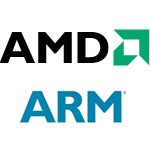Nell'ultimo mese si è molto discusso sugli scenari futuri di AMD, sopratutto nel settore dei processori. La casa di Sunnyvale sembra avere una solida roadmap per il mercato GPU ma è schiacciata da Intel nel contesto CPU x86. Per cercare di risollevare le proprie sorti ed offrire una tipologia di piattaforma vicina a quelle che sono le esigenze emergenti dei clienti (efficienza energetica ed integrazione), AMD ha annunciato nella serata di ieri un'importante partnership con ARM per lo sviluppo di processori Opteron basati su core ARM a 64-bit (ARMv8).

La casa di Sunnyvale sta già sperimentando alcune soluzioni "ibride" x86 + ARM ma il nuovo accordo ha una portata più ampia perchè si rivolge al settore server. AMD sarà una delle prima a proporre server basati su ARMv8 ma, stando ai criteri sottoscritti, disporrà solo della licenza per l'utilizzo e non quella dell'architettura ARMv8. Questo significa che non potrà realizzare soluzioni dal design personalizzato.
L'arrivo degli Opteron ARM 64-bit è previsto per il 2014 in formato SoC multicore per sistemi microserver (piattaforma a bassissimo consumo) in abbinamento alla tecnologia AMD SeaMicro Freedom. Per i server HPC (High Performance Computing), AMD continuerà a sfruttare la ben più potente architettura x86 affiancata dall'integrazione di alcune soluzioni ARM per specifici impieghi.
A questo punto è chiaro che AMD intende ampliare l'offerta ed essere competitiva su due fronti (la famosa "ambidextrous strategy" di cui parlava il CEO Rory Read): sul versante x86, sia client che server, continuerà a sfidare Intel mentre sul nuovo fronte ARM se la vedrà con Nvidia, Qualcomm e Samsung (questi però hanno il vantaggio di disporre della licenza per l'architettura).
Di seguito l'annuncio ufficiale:
SUNNYVALE, Calif. — Oct. 29, 2012 — In a bold strategic move, AMD (NYSE: AMD) announced that it will design 64-bit ARM® technology-based processors in addition to its x86 processors for multiple markets, starting with cloud and data center servers. AMD’s first ARM technology-based processor will be a highly-integrated, 64-bit multicore System-on-a-Chip (SoC) optimized for the dense, energy-efficient servers that now dominate the largest data centers and power the modern computing experience. The first ARM technology-based AMD Opteron™ processor is targeted for production in 2014 and will integrate the AMD SeaMicro Freedom™ supercompute fabric, the industry’s premier high-performance fabric.
AMD’s new design initiative addresses the growing demand to deliver better performance-per-watt for dense cloud computing solutions. Just as AMD introduced the industry’s first mainstream 64-bit x86 server solution with the AMD Opteron processor in 2003, AMD will be the only processor provider bridging the x86 and 64-bit ARM ecosystems to enable new levels of flexibility and drive optimal performance and power-efficiency for a range of enterprise workloads.
“AMD led the data center transition to mainstream 64-bit computing with AMD64, and with our ambidextrous strategy we will again lead the next major industry inflection point by driving the widespread adoption of energy-efficient 64-bit server processors based on both the x86 and ARM architectures,” said Rory Read, president and chief executive officer, AMD. “Through our collaboration with ARM, we are building on AMD’s rich IP portfolio, including our deep 64-bit processor knowledge and industry-leading AMD SeaMicro Freedom supercompute fabric, to offer the most flexible and complete processing solutions for the modern data center.”
“The industry needs to continuously innovate across markets to meet custumers’ ever-increasing demands, and ARM and our partners are enabling increasingly energy-efficient computing solutions to address these needs,” said Warren East, chief executive officer, ARM. “By collaborating with ARM, AMD is able to leverage its extraordinary portfolio of IP, including its AMD Freedom supercompute fabric, with ARM 64-bit processor cores to build solutions that deliver on this demand and transform the industry.”
The explosion of the data center has brought with it an opportunity to optimize compute with vastly different solutions. AMD is providing a compute ecosystem filled with choice, offering solutions based on AMD Opteron x86 CPUs, new server-class Accelerated Processing Units (APUs) that leverage Heterogeneous Systems Architecture (HSA), and new 64-bit ARM-based solutions.
This strategic partnership with ARM represents the next phase of AMD’s strategy to drive ambidextrous solutions in emerging mega data center solutions. In March, AMD announced the acquisition of SeaMicro, the leader in high-density, energy-efficient servers. With today’s announcement, AMD will integrate the AMD SeaMicro Freedom fabric across its leadership AMD Opteron, ARM- and x86-based processors, that will enable hundreds, or even thousands of processor clusters to be linked together to provide the most energy-efficient solutions.
“Over the past decade the computer industry has coalesced around two high-volume processor architectures – x86 for personal computers and servers, and ARM for mobile devices,” observed Nathan Brookwood, research fellow at Insight 64. “Over the next decade, the purveyors of these established architectures will each seek to extend their presence into market segments dominated by the other. The path on which AMD has now embarked will allow it to offer products based on both x86 and ARM architectures, a capability no other semiconductor manufacturer can likely match.”
At an event hosted by AMD today in San Francisco, representatives from Amazon, Dell, Facebook, and Red Hat participated in a panel discussion on opportunities created by ARM server solutions from AMD.
